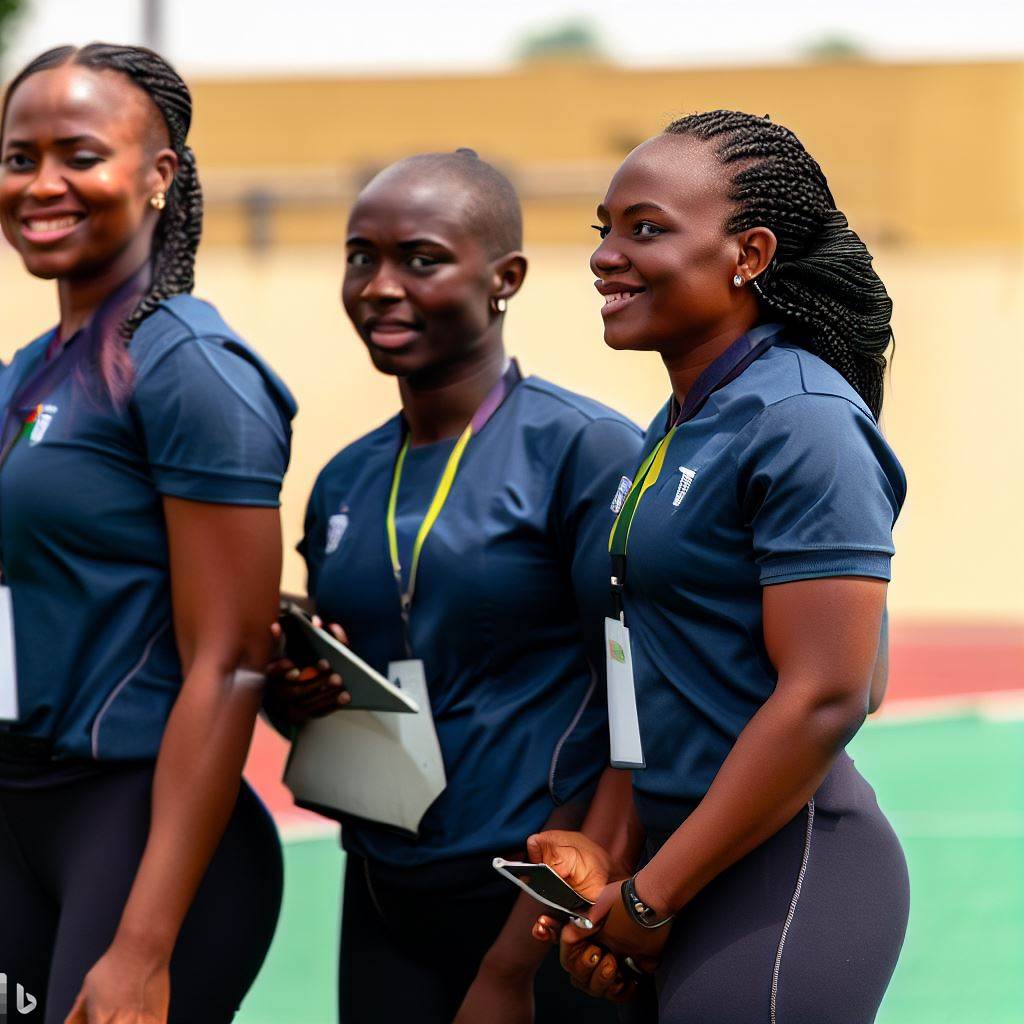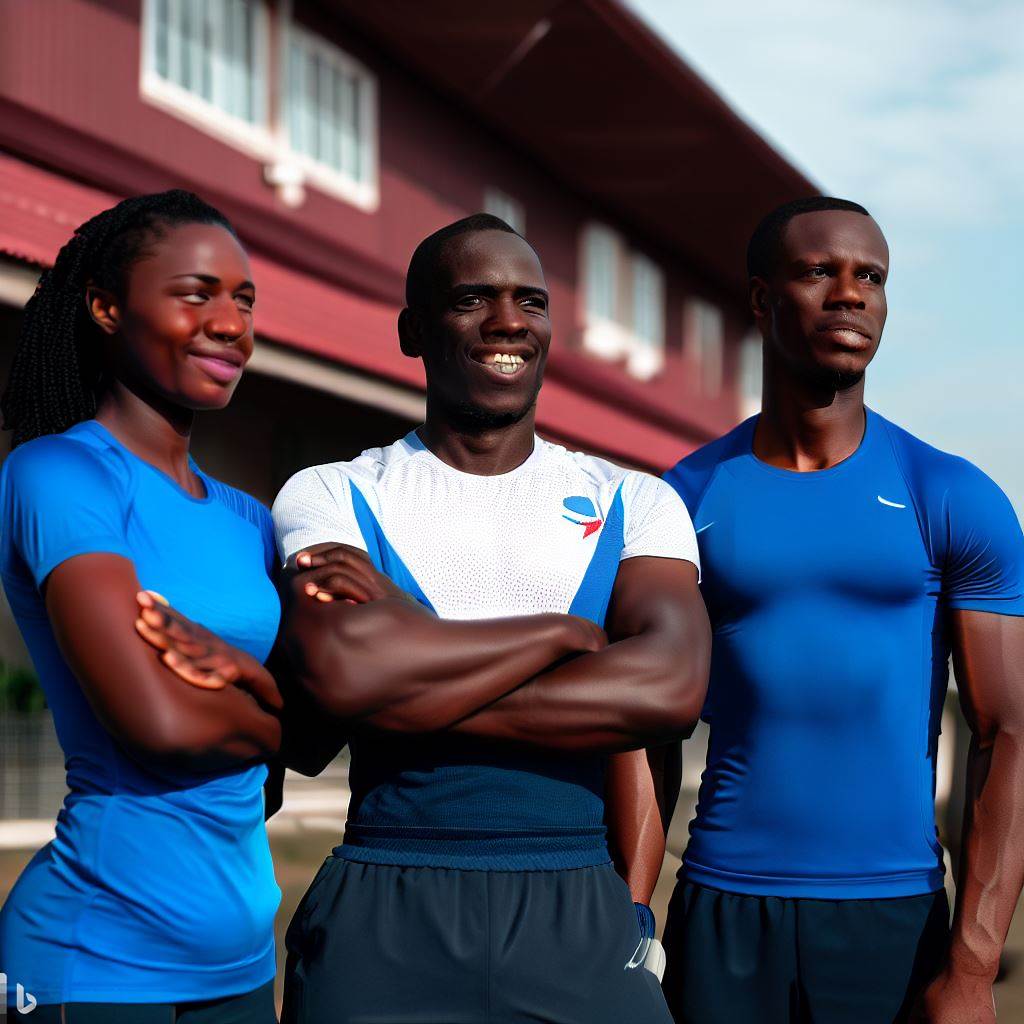Introduction
Exploring the remarkable journey of Women in Athletic Training, this insightful discourse sheds light on their unique experiences and contributions within Nigeria’s dynamic field.
A. Brief background on the importance of women in athletic training
Women in Athletic Training contribute significantly, enriching Nigeria’s sports scene with unique skills and perspectives for enhanced performance.
Despite the nation’s vibrant athletic landscape, women’s voices remain underrepresented, limiting both female athletes’ progress and the profession’s growth.
By spotlighting Women in Athletic Training in Nigeria, we unveil challenges, opportunities, and their inspiring journey towards a more inclusive and diverse industry.
B. Overview of the Nigerian athletic training landscape and the need for female voices
Women in Athletic Training are indispensable, offering specialized care and training techniques that address female physiology, ensuring tailored protocols.
Their holistic approach values mental and emotional well-being, fostering an environment for athletes to reach their full potential.
In the following sections, we will dive into the stories, experiences, and achievements of women in athletic training in Nigeria.
Their voices deserve to be heard, celebrated, and utilized for the betterment of Nigerian athletics.
Historical Perspective: Women in Athletic Training
In this section, we will discuss the historical barriers faced by women in the field of athletic training and highlight the pioneering women who made significant contributions to athletic training in Nigeria.
A. Historical Barriers Faced by Women in the Field
- Discrimination: Women faced discrimination and prejudice, with limited opportunities for education and career advancement.
- Stereotypes: Traditional gender roles imposed the belief that women were not capable of handling physically demanding jobs.
- Resistance from Male Dominated Field: Athletic training was predominantly male dominated, making it difficult for women to enter and be accepted in the profession.
- Lack of Support and Mentorship: Women lacked support networks and mentors, making it harder for them to navigate their careers.
- Access to Resources: Limited access to educational resources and training programs hindered women’s progress in the field.
B. Pioneering Women in Athletic Training in Nigeria
- Dr. Abulele Nnonye: She became Nigeria’s first female athletic trainer in the 1970s. Her determination paved the way for other women to enter the field.
- Dr. Abisola Isaac Oladapo: An accomplished sports medicine specialist in Nigeria, she made significant contributions to the development of athletic training in the country.
- Adenike Adeyemo: As a certified athletic trainer, she broke barriers and stereotypes by excelling in a male-dominated field.
These women overcame the historical barriers and made significant contributions to the field of athletic training in Nigeria.
They shattered stereotypes by proving their competency and dedication despite the challenges they faced.
Overall, the historical barriers faced by women in the field of athletic training were numerous and challenging.
However, through the perseverance of pioneering women like Dr. Abulele Nnonye, Dr. Abisola Isaac Oladapo, and Adenike Adeyemo, the doors have been opened for women in Nigeria’s athletic training field.
Their contributions have paved the way for future generations of female athletic trainers, inspiring them to break boundaries and achieve success in this male-dominated profession.
Read: Roles & Responsibilities of a Fitness Nutritionist
Current Status of Women in Athletic Training
When it comes to the representation of women in athletic training positions in Nigeria, the statistics are quite disheartening.
Out of the total athletic trainers in the country, only a mere 25% are women.
These low numbers can be attributed to the numerous challenges faced by women in gaining equal opportunities and recognition in the field.
Gender bias and stereotypes play a significant role in limiting their advancements.
One major challenge faced by women in athletic training is the lack of support and mentorship.
Many women struggle to find female role models or mentors who can guide them in their careers, leading to feelings of isolation and discouragement.
Additionally, there is a persistent belief that women are not as physically capable as men, which often results in them being overlooked for certain positions or assignments.
This mindset undermines the abilities and qualifications of women in the field.
Another significant challenge is the lack of representation in leadership roles.
Women are seldom given the opportunity to hold managerial or decision-making positions, despite their qualifications and expertise.
This lack of representation hinders their progress within the field.
Furthermore, discriminatory practices such as unequal pay and limited career growth opportunities still prevail.
Women often earn less than their male counterparts for the same work and face difficulties in advancing their careers.
It is essential to recognize and address these challenges in order to promote gender equality and create a supportive environment for women in athletic training.
Encouraging mentorship programs, focusing on diversity and inclusion, and implementing policies that address gender disparities are crucial steps in this direction.
Key Points
- Only 25% of athletic trainers in Nigeria are women.
- Challenges include lack of support, mentorship, and gender bias.
- Belief in women’s physical limitations hinders their opportunities.
- Lack of representation in leadership roles restricts career growth.
- Discriminatory practices result in unequal pay and limited advancement.
By acknowledging the current status of women in athletic training and actively working towards creating equal opportunities, Nigeria can foster an inclusive environment where women feel empowered to thrive and succeed in the field.
Read: Nigeria’s Top Schools for Sports Nutrition Training
Success Stories: Women Making a Difference
Here are inspiring stories of women making a significant impact:
- Dr. Aisha Ibrahim: trailblazer in Nigerian athletic training, broke ground as the country’s first female athletic trainer. Her dedication and expertise have facilitated countless athletes in their recovery from injuries and in realizing their full potential.
- Coach Fatima Ahmed: Renowned in her field, she devoted her life to coaching and mentoring young athletes. Her tireless efforts have uncovered and nurtured promising talents who have represented Nigeria on national and international stages.
- Grace Okeke: As a certified athletic trainer, she played a pivotal role in promoting sports medicine and injury prevention in Nigeria. Her passion for her work inspires many young women to challenge traditional gender roles and pursue careers in athletic training.
- Dr. Chinwe Eze: a respected sports medicine specialist, is a prominent figure in Nigerian athletics. Her groundbreaking research in athletic training has contributed to innovative rehabilitation techniques, enhancing athletes’ overall performance.
- Coach Stella Obi: Coach Obi boasts an impressive track record of coaching both male and female athletes to success. Her dedication, attention to detail, and motivational skills have earned her numerous accolades within the athletic training field.
They’ve demonstrated that gender should never be a barrier to success and that with passion, hard work, and determination, anything is attainable.
These success stories underscore the vast talent and potential of female athletic trainers in Nigeria. They affirm that women can excel in this field, delivering quality care and support to athletes at all levels.
In essence, these women’s triumphs in Nigerian athletic training positions serve as a wellspring of motivation and inspiration.
By celebrating their achievements, we can encourage more women to embrace careers in athletic training and continue breaking barriers in this domain.
Read: Salary Insights for Fitness Nutritionists in Nigeria

Breaking Barriers: Challenges and Solutions
Women in athletic training face numerous challenges in the field, but there are potential solutions that can help break these barriers and promote gender equality.
A. Common Challenges Faced by Women in Athletic Training
- Limited opportunities for professional growth due to gender biases and stereotypes.
- Inadequate support systems within the field, making it difficult to balance personal and professional life.
- Unequal pay and compensation compared to their male counterparts for the same level of work.
- Lack of mentorship programs specifically tailored for women in athletic training.
- Underrepresentation of women in leadership positions and decision-making roles.
B. Potential Solutions
To address these challenges, several solutions can be implemented:
1. Mentorship Programs
Establishing mentorship programs that pair experienced women athletic trainers with aspiring professionals can provide guidance and support to overcome obstacles.
2. Networking Opportunities
Create networking opportunities for women in athletic training to connect with peers, share experiences, and build professional relationships.
3. Equal Representation Initiatives
Promote equal representation by encouraging organizations to implement initiatives that aim to increase the number of women in leadership positions.
4. Advocacy and Education
Advocate for the importance of gender diversity in athletic training through education and awareness campaigns.
5. Addressing Gender Bias
Implement policies and practices to actively address gender biases and stereotypes, ensuring equal opportunities for women in the field.
6. Work-Life Balance Support
Provide support systems and flexible work arrangements to assist women in achieving a balance between their personal and professional lives.
7. Empowering Women in Negotiation
Offer training programs that empower women with negotiation skills and strategies to secure fair compensation and benefits.
8. Building Confidence
Encourage women in athletic training to build their self-confidence and assertiveness through workshops and mentorship.
9. Collaboration and Partnerships
Foster collaboration and partnerships between athletic training associations, educational institutions, and organizations to collectively address gender barriers.
By implementing these solutions, we can work towards breaking the barriers faced by women in athletic training and create a more inclusive and equitable field.
Read: A Guide to Becoming a Sports Nutritionist in Nigeria
The Importance of Female Voices in Athletic Training
A. Why it is crucial to have more female voices in the field
Women’s presence in athletic training is pivotal for several reasons:
- Representation: More female voices ensure better gender balance within the profession.
- Diverse Perspectives: Women provide unique insights that enrich athlete understanding and care.
- Empathy and Understanding: Female trainers connect on a deeper level with female athletes, offering tailored support.
- Mentorship: They inspire aspiring female athletic trainers to pursue their dreams.
- Specific Health Concerns: Addressing issues like menstrual cycles and pregnancy ensures holistic care.
- Building Trust: Female voices foster trust, especially for athletes who prefer same-gender trainers.
B. The unique perspectives and contributions that women bring to athletic training
Moreover, women contribute uniquely to athletic training:
- Communication: Their effective communication improves relationships with athletes, coaches, and medical professionals.
- Collaboration: They enhance teamwork, leading to improved athletic performance.
- Leadership: Female voices promote a positive work environment and professional growth.
- Empowerment: They empower female athletes, providing mentorship and promoting self-confidence.
- Advocacy: Women advocate for gender equality, addressing challenges in a male-dominated industry.
- Inclusion: They create an inclusive and diverse environment, breaking stereotypes and promoting acceptance.
By including more female voices in athletic training:
- Improved Athlete Care: Female trainers address unique concerns, enhancing overall athlete well-being.
- Enhanced Performance: Diverse perspectives and collaboration drive innovative strategies, boosting athletic performance.
- Breaking Barriers: Female voices challenge norms, paving the way for future generations.
- Inspiring Change: They showcase expertise and capabilities, inspiring change in the field.
- Supportive Community: Female voices nurture an inclusive environment for all athletes.
- Shaping the Future: Engaging female voices allows athletic training to adapt to a changing society.
The inclusion of more female voices in athletic training is essential and beneficial across various levels.
Women bring unique perspectives, diverse skills, and improvements to athlete care, performance, and industry development.
Recommendations for Empowering Women in Athletic Training
To promote gender equality and empower women in the field of athletic training, several recommendations can be implemented.
These recommendations focus on the importance of education, training, and creating supportive environments.
By following these suggestions, the field can become more inclusive and open doors for female professionals.
1. Enhance educational opportunities
- Provide scholarships and grants specifically targeting women pursuing athletic training education.
- Develop mentorship programs to connect aspiring female athletic trainers with experienced professionals.
- Encourage universities to offer comprehensive degree programs in athletic training that cater to women’s needs.
2. Promote leadership and career development
- Organize workshops and seminars focused on leadership, communication skills, and career advancement for women in athletic training.
- Establish networking opportunities where women can connect with industry leaders and gain exposure to new job prospects.
- Encourage women to pursue certifications and advanced degrees to enhance their professional qualifications.
3. Create safe and supportive environments
- Establish a zero-tolerance policy for gender discrimination and harassment within athletic training institutions.
- Implement diversity training programs to foster inclusive and respectful attitudes towards women in the field.
- Ensure equal opportunities for both men and women in terms of job assignments, promotions, and salary negotiations.
4. Encourage work-life balance
- Offer flexible work arrangements that accommodate the personal and family needs of female athletic trainers.
- Promote the importance of self-care and mental wellness to prevent burnout and support overall well-being.
- Advocate for maternity leave policies that allow women to take time off and return to their careers without negative consequences.
5. Increase visibility and representation
- Highlight successful women in athletic training through media coverage, interviews, and recognition programs.
- Encourage female athletic trainers to actively participate in conferences, seminars, and professional organizations.
- Involve women in decision-making processes within athletic training associations and committees.
6. Engage in community outreach
- Collaborate with schools and local sports teams to educate young girls about the opportunities available in athletic training.
- Organize outreach programs that introduce girls to sports medicine and encourage them to pursue careers in this field.
- Establish mentorship programs where female athletic trainers can volunteer their time to guide aspiring young women.
7. Conduct research and data collection
- Conduct research studies on gender disparities in athletic training and identify areas for improvement.
- Collect data on the number of women entering the field, their career progression, and any gender-based challenges they face.
- Use the data collected to drive policies, programs, and initiatives that support the advancement of women in athletic training.
By implementing these recommendations, the athletic training field in Nigeria can foster gender equality, empower women, and create a supportive and inclusive environment for all professionals.
It is crucial to recognize the valuable contributions women can make in this field and provide them with equal opportunities to thrive and excel.
Conclusion
This blog section explored the experiences and perspectives of women in the athletic training field in Nigeria.
The key points discussed include the challenges faced by women in a male-dominated industry, the importance of promoting gender equality and diversity, and the need to empower women’s voices in the field.
It is crucial to recognize and support the contributions of women in athletic training to foster an inclusive and progressive sports culture in Nigeria.
By providing equal opportunities and platforms for women, we can create a more balanced and diverse athletic training field that harnesses the full potential of all professionals, regardless of gender.
Let us continue working towards breaking down gender barriers and embracing the valuable insights and expertise of women in Nigerian sports.




